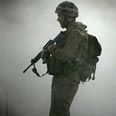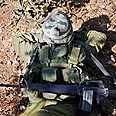

116 fallen, many more unresolved questions
IDF soldiers receive command to hold fire Monday, but with end of fighting army awaiting difficult times in which answers must be provided to number of profound issues, including functioning of command apparatus in field and severe logistical problems. Above all hangs question how ready was IDF to truly return to Lebanon?
The ceasefire is in its very first hours, yet it is already clear to the Israel Defense Forces that after 33 days of fighting on the northern border during which 116 IDF soldiers in both compulsory and reserve service were killed, and hundreds wounded, about 50 of them critically, a long list of investigations of the dramatic events on the northern border and in southern Lebanon is needed.
There are already voices in the IDF calling for an external investigation, but it is yet to be decided what kind of investigation will be made and if the political apparatus will request a separate investigation. However, it is already clear what the burning issues needing intensive investigation within the IDF:
- The arming and strengthening of Hizbullah:
To what extent did the IDF recognize the power Hizbullah had accumulated, in weapons, short- and long-range rockets, different types of anti-tank missiles, land-to-sea missiles, and hundreds of outposts, bunkers, and tunnels, and sophisticated methodology.
- The policy of restraint: Was it correct to wait six years to carry out a significant offensive operation against Hizbullah? Why didn't the IDF initiate an attack at an earlier stage? And why didn't they demand the political establishment to be tough with Hizbullah and its deployment along border?
- The IDF's preparedness for a confrontation with Hizbullah: How prepared were IDF plans suited for such a confrontation? What exercises were conducted for deploying tens of thousands of soldiers in Lebanese territory during harsh fighting, cooperation between the arms of the military, preparation and knowledge of the soldiers who had never set foot in Lebanon and who are familiar only with the fighting in Gaza and the West Bank?
- The issue of fortification: The relative ease in which IDF instruments were damaged, which before the war were considered fortified, negatively affected the Israeli public, and the armored corps lost dozens of soldiers in many events in which anti-tank missiles and road-side bombs damaged their tanks, even the most sophisticated of them, including the Merkava 4 tank. In the IDF they will need to thoroughly examine the issue of fortification from all perspectives.
- Management of interpersonal relationships within the command apparatus: Throughout the war, difficult disagreements among senior officers in the IDF, reports of rifts between brigade and division commanders, intense arguments, controversy over operational activities, outward criticism hurled at one another were all witnessed. There is no doubt that such tainted relations trickle down to the soldiers in the field affecting their understanding of their mission, or how to achieve it.
- The issue of Major-General Adam: One of the most intriguing questions after the war is how will Northern Command Chief Udi Adam behave after the war subsides and after the surprise Chief of Staff Dan Halutz prepared
for him in the form of his deputy, Major-General Moshe Kaplinsky. In the IDF, there has already been someone who hinted at a dismissal. Halutz denied this, but it is obvious to everyone that something happened within IDF's elite and that the knives have yet to be drawn.
- The issue of logistics: Though the IDF tried to provide the soldiers in the field with all the requested equipment, from socks through to canned beef and renewed flack jackets for reserve soldiers, still there were many shortages and unending complaints from soldiers in the field. In the worse cases, soldiers were encountered hardships due to lack of food and water. Dozens of soldiers became dehydrated because for lack of drinking enough while operating in Lebanese villages.
In addition to these issues, the IDF will need to grapple with profound questions related to the circumstances of the kidnapping of the reservists Eldad Regev and Ehud Goldwasser, problematic behavior in during a substantial number of operations deep in Lebanese territory, and defective coordination between soldiers in the field and their commanders, especially in reserve units, in defining the mission and how to achieve it.
In the past few days, senior IDF officers have demanded an external investigation: "If we want to arrive at a true investigation, to learn lessons, and to be real toward the IDF and the public, we must let senior reserve officers do the work," said one officer.
He added, "It shouldn't be that each commander will investigate himself, or will be checked by another commander. It will look unreliable and will intensify the tensions."















